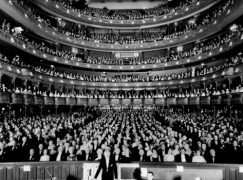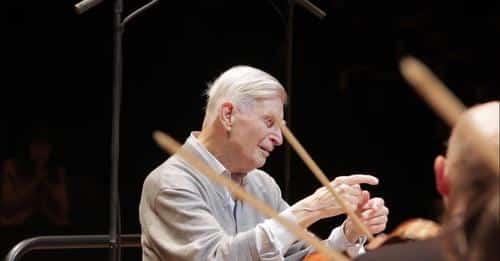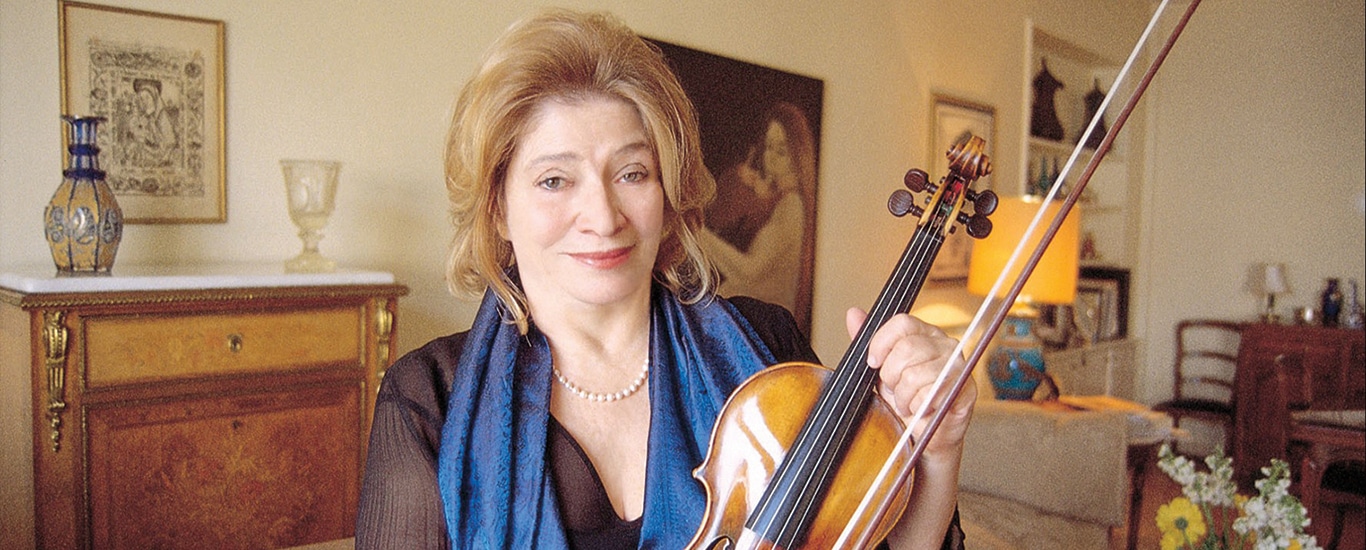Metropolitan Opera is selling off the company jewels
mainChristie’s announcement:
New York–Christie’s announces The Metropolitan Opera Guild Collection, a dedicated auction of rare musical manuscripts and memorabilia, to take place in New York on June 15, 2017, with two exquisite pieces of jewelry to be sold in the Magnificent Jewels auction on June 20, 2017. Funds from the sale will benefit the Opera Guild and the Metropolitan Opera. Highlights will be previewed during a global tour with exhibitions in London and Hong Kong in April and May. The full collection will be on preview in New York June 10-14.
The collection includes approximately 90 lots and represents a selection of autograph material from some of the most important composers of the Western classical tradition spanning from the Baroque era to the 20th-century. The majority of manuscripts come from the carefully assembled gift of Edwin Franko Goldman (1878-1956), renowned American composer and trumpeter with the Metropolitan Opera. The sale is led by the sole surviving autograph musical manuscript by Schubert for his Piano Sonata in A flat Major (estimate: $350,000-500,000). Additional highlights include annotated manuscripts and letters by the trinity of Bach, Mozart and Beethoven. Illuminating the sale are objets d’art with provenance grounded in opera and classical music including Enrico Caruso’s Cartier gold eyeglass case with glasses and Arturo Toscanini’s Gubelin open-faced pocket watch.
Sven Becker, Head of Books & Manuscripts, Christie’s New York, remarks: “Christie’s is honored to be entrusted with this special collection offering a concentration of fine musical autograph material. Collections such as this come to the market very infrequently; even more rarely do they bear the name of such a well-regarded American institution.”
“We are pleased to be working with Christie’s to present this auction at the time of two important milestones in 2016/7: the 60th anniversary of the death of Edwin Franko Goldman and the 50th anniversary of the Met Opera at Lincoln Center,”says Richard J. Miller Jr., President of the Metropolitan Opera Guild. “Funds generated from this sale will ensure that the Guild and the Metropolitan Opera are poised to continue fulfilling their respective missions for years to come.”
Cataloguing and complete details of the sale will be available in May 2017.






Edwin Franko Goldman’s chief claim to fame was his founding of the Goldman Band in 1911, which gave concerts in New York City, primarily on the mall in Central Park and The Green at Columbia University. Following Goldman’s death in 1956, the band continued operations under several conductors (including his son Richard Franko Goldman) until 2005. Over the years the band recorded several albums for RCA, American Decca, Capitol Records and New World Records. Goldman also founded the American Bandmasters Association and, along with John Philip Sousa, was named Honerary Life President.
They are that desperate, aren’t they?
even more than you could think 🙂
why in god’s name did you put a smile – creepy
1. Don’t say God’s name in vain
2. Because this is my style of communication when I am on the Net, especially SM ( social media) , this is a kind of your nick with that exclamation mark at the end ( ME!) – just try to think divergently and everything will be O’K with you tout-de-suite, I ensure you
P.S. I wish you every happiness 🙂 particularly for the coming Holy week ( hopefully you are a christian, like me 🙂
I’ll note that “God” is not a name, it’s more of a job title.
The Bible presents the name as “YHWH” or “Yahweh”.
speaking frankly ( again) Bible is a kind of compilation which was ( or has/had been – as you like) made of early sources , like ancient Assyrian etc and then translated into Aramean , Jewish , Greek …. So God is the name that something rather esoteric ( fortunately really esoteric for the modern people, not eXoteric as many want it have in their minds ), not jewishly like “Yahweh” or so . … that’s all I can say on the subject, very briefly …. just my opinion, of course 🙂
Yes, they are that desperate, and that is not the half of it. This will be repeated in city after city in the United States, for both opera companies and symphony orchestras, unless wrenching changes are made, and soon. The most disheartening this is that this is happening in New York, which historically has been one of the few American cities with a (formerly) strong commitment to the arts. Bluntly, they will have to find some way to reach out to young people and tie themselves to the intellectual life of the community while cutting costs and steering themselves away from being a plaything of the bored 1%. The musicians’ unions, who have fought reasonable changes in work rules, expansion of the repertoire, and any kind of outreach in city after city, will have to go. So will the bloated and redundant administrative staffs, which have five people doing jobs that could be done, in this day of technology and advanced communications, by one or two persons. The situation in New York is additionally complicated by the dead hand of IATSE, which has resulted in some of the stagehands making over $500,000 per year (IATSE has a well-deserved reputation as the most corrupt, discriminatory, and nepotistic union (if you can even call it that–it is an insult to real unions like the Steelworkers and the United Automobile Workers) in the United States). As far as repertoire, all that needs to be said is that the Metropolitan Opera this year presented an opera written by a female composer for the first time since 1903. When even the purported sure-fire box office hits like “Carmen” and “La Boheme” are drawing smaller and smaller audiences, and there are fewer and fewer singers with such a reputation that they can fill a house even if they are singing the Milan telephone directory, they definitely need to take some risks and broaden the repertoire.
In an environment when younger people of wealth are reluctant to donate to established cultural institutions, strongly preferring organizations that deal with such things as the environment, medical research, public health, and education, and when the general public mood is so anti-intellectual and so hostile to what it deems (inaccurately) “elitism” that one would stand a better chance of getting a bill through Congress to fund the free distribution of child pornography than any kind of subsidies for symphonies or opera companies (subsidies that are more or less routine in Europe), everyone needs to act as though the survival of these institutions is at stake. This is no time for the status quo.
No one else could have stated the situation any better than you did.
I have become more and more hesitant about donations. In academical research (I’m in the academic world) institutional fees take most of the amount obtained for research, in fact one has to apply for 30%-40% more than the cost of every project in order to satisfy the administration ogre. If you donate to the Met or to other high profile opera house or symphony orchestra you just finish payng Dudamel’s fee or an enormous administration, it’s uncertain how much you support the Art, but you surely help to preserve the status quo.
… and if you donate beautiful things to them they will be auctioned.
Well said indeed, but you left out the part where the Met cannot seem to contract the best singers five years in advance without them bailing out. I have a feeling those with the voices we want to hear and pay for do not want to work at the Met and I do not believe Gelb is up to the task of making the house a place where they want to perform. Witness Netrebko and Kaufmann not performing here in 2017-2018. I think the issues with artistic management have a lot to do with this as well. Opera has never been part of our national DNA and will become even less so now.
Well said, but I disagree about the staffs of many of these organizations. Very few are bloated and redundant – no one can afford it!
Many of these folks are overworked and underpaid, asked to perform multiple duties and work long hours for modest/moderate amounts. Some of the larger organizations do have very large development staffs for obvious reasons, which yes, can be considered bloated, but I am speaking more to the folks in the trenches.
there are success stories elsewhere – mostly in the orchestra world after a strike or crisis.
Every bit of this comment. It’s also become the status quo to higher lighter and “safer” artists across the board. Sopranos singing the Beethoven 9 who can’t be heard on a high C over the orchestra. Maria Callas wasn’t “safe” she took big risks onstage and it was thrilling to watch her… Even when risks didn’t succeed. It’s great that people donate to the institutions, but how much of that money ends up in the actual artist community? In developing young singers? Not much. The education community has a vested interest in proofing up safer smaller voices for their own and pushing the bigger and more dramatic voices to the side. Most every heroine in the literature is a steriotypical princess in a tower. Where are the new power female characters? For New opera’s we’ve got Moby Dick? All male cast except for a soprano-boy character. Opera has a lot of baggage, literally, maybe a big shift will be good for it. You’re absolutely right, though, some big changes and some big risks need to be made.
“The musicians’ unions, who have fought reasonable changes in work rules, expansion of the repertoire, and any kind of outreach in city after city, will have to go.”
Not true! There’ve been many changes in both work rules and outreach in most major orchestra contracts in the last decade. Further, there is nothing about repertoire stated in any orchestra union contract that I know of. When the musicians’ union (AFM) is gone so, too, will the profession as a viable way to make a living be gone. This is hardly the first time that I’ve seen anti-union garbage posted without actual facts on this and other music blogs over the last number of years.
Concerning IATSE – those on the Met’s staff work not only much of the day but far into the night so that the Met can mount seven different operas/week in an ongoing basis. Perhaps you should try doing this work.
I suggest you turn your attention to bloated boards of directors whose members enjoy seeing their names listed in programs without doing much to advance the organizations that they are supposed to steward.
Oh please, enough with the justification that the IATSE members work long hours for their disproportionate salaries. I’d say most of us would work long hours moving crap around for that kind of recompense especially since I’d get to mostly sit on my backside from mid-July to mid-September every year. The guys in my local bagel store are there from 3:30 AM 365 days a year and some of them don’t get to leave until 8 PM, working their tails off. None of them are getting half a million a year or, I’d guess, a tenth of it.
Most of you don’t have the expertise to “move crap around” much less building new sets in the months the Met is on hiatus. When the infamous Wagner Ring contraption was built in Montreal, just who was it that had to rebuild and install it at the Met while reinforcing the stage to bear its weight? I’m sure your underpaid non-unionized undocumented bagel workers would’ve been up to the task.
My response was specifically to the point that these guys deserve to be overpaid because of the long hours worked, not their skillset. Whatever their skillset (and they’re carpenters and electricians who do move crap around a lot, not brain surgeons) their long working hours are not reason enough to pay them the kind of money they get.
Their skillset along with hours worked is exactly why they get paid what they do. Building sets from plans, operating computer-controlled lighting, stage carousels and other equipment throughout the house requires more than just being carpenters and electricians. IATSE installs its best-trained and most experienced members at the Met.
The Met has for years tried to make opera as theatre. The Broadway approach has put more emphasis on ensemble and orchestra than on star singers. The days of waiting all night for standing room for Price, Nilsson, Caballe, Corelli, etc. are over. The awful new productions such as the Rigoletto and Traviata have driven audiences away who love the Met for the voices. It is fairly easy to get tickets for Renee Fleming or Anna Netreko. The mystic of the old days is long gone, with the gold curtain that is hardly used. The Met has made opera going mediocre and taken the Grand out of grand opera. Pretty soon they will have to give Green Stamps as an insentive to buy tickets.
Maybe they should auction off Peter Gelb instead.